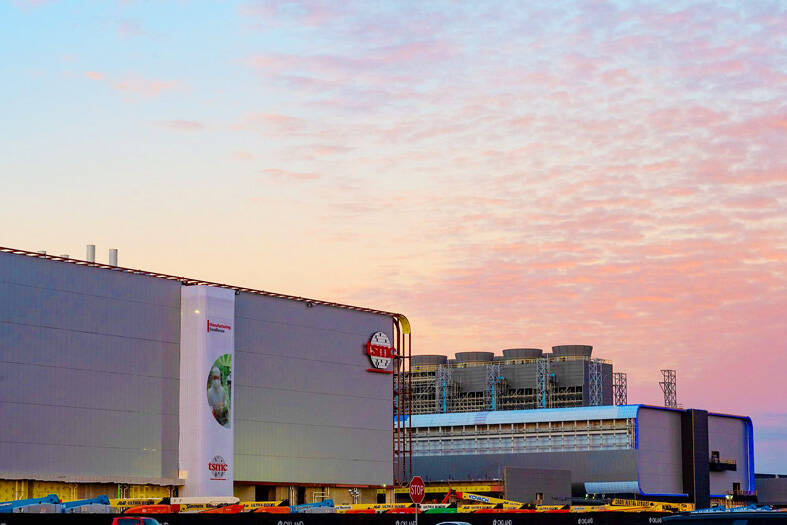Taiwan Semiconductor Manufacturing Co (TSMC, 台積電), the world’s largest contract chipmaker, yesterday said it has no concrete plans to build a second plant in Japan.
TSMC’s comments came after Cliff Hou (侯永清), the company’s senior vice president of Europe and Asia sales and corporate research, said in a recent interview with Tokyo TV’s World Business Satellite that his company would not rule out building a second plant in Kumamoto Prefecture.
TSMC has started construction of a fab in the prefecture.

Photo: Bloomberg
TSMC needs to have a good understanding of how well the first fab in Kumamoto performs before making a decision on a second facility in the prefecture, Hou said.
The company yesterday said it has no concrete plans for new investments in Japan, but added that it has not ruled out the possibility of building a second fab in the country.
Japanese Minister of Economy, Trade and Industry Yasutoshi Nishimura said a second fab by TSMC would be very welcome in Japan, adding that the government would do its best to attract foreign semiconductor suppliers to invest in the country.
In November last year, TSMC announced that it would spend up to US$2.12 billion to set up a majority-owned foundry services provider in Kumamoto, with Sony Semiconductor Solutions Corp taking a stake of up to 20 percent.
After the joint venture — Japan Advanced Semiconductor Manufacturing Inc — was set up, TSMC broke ground on the plant in Kumamoto in April, with mass production scheduled to start by the end of 2024.
In related news, TSMC yesterday reported that sales last month rose 50 percent, despite slumping consumer electronics demand and COVID-19 disruptions in China.
The company reported revenue of NT$222.7 billion (US$7.3 billion), adding to a long streak of increasing sales that was supercharged by a spike in demand during the COVID-19 pandemic. The company is also the exclusive supplier of Apple Inc’s silicon chips for iPhones and Macs.
TSMC shares are down more than 20 percent this year after more than doubling during the pandemic.
The global economic slowdown has diminished consumer demand for many products that use TSMC chips, but the company and its customers still expect the long-term trend in electronics demand to keep going up.
TSMC has committed to spending about US$36 billion in capital expenditure this year.
Additional reporting by Bloomberg

Semiconductor business between Taiwan and the US is a “win-win” model for both sides given the high level of complementarity, the government said yesterday responding to tariff threats from US President Donald Trump. Home to the world’s largest contract chipmaker, Taiwan Semiconductor Manufacturing Co (TSMC, 台積電), Taiwan is a key link in the global technology supply chain for companies such as Apple Inc and Nvidia Corp. Trump said on Monday he plans to impose tariffs on imported chips, pharmaceuticals and steel in an effort to get the producers to make them in the US. “Taiwan and the US semiconductor and other technology industries

The US Federal Reserve is expected to announce a pause in rate cuts on Wednesday, as policymakers look to continue tackling inflation under close and vocal scrutiny from US President Donald Trump. The Fed cut its key lending rate by a full percentage point in the final four months of last year and indicated it would move more cautiously going forward amid an uptick in inflation away from its long-term target of 2 percent. “I think they will do nothing, and I think they should do nothing,” Federal Reserve Bank of St Louis former president Jim Bullard said. “I think the

SMALL AND EFFICIENT: The Chinese AI app’s initial success has spurred worries in the US that its tech giants’ massive AI spending needs re-evaluation, a market strategist said Chinese artificial intelligence (AI) start-up DeepSeek’s (深度求索) eponymous AI assistant rocketed to the top of Apple Inc’s iPhone download charts, stirring doubts in Silicon Valley about the strength of the US’ technological dominance. The app’s underlying AI model is widely seen as competitive with OpenAI and Meta Platforms Inc’s latest. Its claim that it cost much less to train and develop triggered share moves across Asia’s supply chain. Chinese tech firms linked to DeepSeek, such as Iflytek Co (科大訊飛), surged yesterday, while chipmaking tool makers like Advantest Corp slumped on the potential threat to demand for Nvidia Corp’s AI accelerators. US stock

Cryptocurrencies gave a lukewarm reception to US President Donald Trump’s first policy moves on digital assets, notching small gains after he commissioned a report on regulation and a crypto reserve. Bitcoin has been broadly steady since Trump took office on Monday and was trading at about US$105,000 yesterday as some of the euphoria around a hoped-for revolution in cryptocurrency regulation ebbed. Smaller cryptocurrency ether has likewise had a fairly steady week, although was up 5 percent in the Asia day to US$3,420. Bitcoin had been one of the most spectacular “Trump trades” in financial markets, gaining 50 percent to break above US$100,000 and